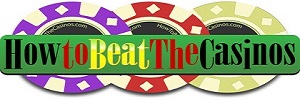Beat Those Casinos!
In this article, we’re going to investigate the basic principles that will decide whether or not you’re able to beat the casinos. As my first real name is David, and casino gambling is a bit like fighting a David and Goliath battle, I’ve called these basic principles “The Four D’s”.
The four D’s are as follows:
1) Decision Making
2) Determination
3) Dollars (or pounds, or euros etc)
4) Discipline
In order to win at casinos over the long term, all of these Four D’s are required by a player. A shortage of any of these D’s can lead to disaster. Let’s look at how each of the four principles is applied in practice.
D One: Decision Making
Choice of Game
Any experienced gambler will know that there are both good and bad games to play in a casino. These games are clearly identifiable by the percentage edge that is normally given to the house/casino by the rules of the game. A gambler who plays games with a low house edge is more likely to win / hold their own in the long term than a gambler who plays games with a high house edge. It’s as simple as that.
And so the first decision you must make is about the kind of games you’re willing to play. Typical house edge percentages for popular casino games are around the following: Blackjack 0.5 – 1% depending on rules / variations; Roulette 2.63% with single zero and 5.26% with single and double zero; Craps – pass line about 1.41% (but field and horn bets are much higher); Baccarat – about 1.13% on banker bets and 1.24% on player bets; slot machines about 3% – 15% depending on bet size, progressive meter etc.
Here’s the reality: If I play blackjack for 1000 hands at $5 a hand, I’m putting $5000 “into play”. If the house takes 0.5% of this, they would expect to make $25 from me. If I spin 1000 single-zero roulette spins at $5 total a spin, I’m putting $5000 into play. If the house takes 2.63% of this, they would expect to make $131 from me. That is five times worse than blackjack! If I play 1000 slot machine spins at $5 total a spin (i.e. 20 line machine with 25c per line,etc), I’m putting $5000 into play. If the house takes 8% of this (as an average figure), they would expect to make $400 from me. That is three times worse than single-zero roulette, but 16 times worse than blackjack! Certainly I wouldn’t have been banned from UK casinos if I’d simply played slot machines! Most casinos make the bulk of their profits from slot machines – I honestly believe that they would take out all table games if they had the choice…
And so your choice of game is very important – and the rule of thumb is that you should develop a passion for low edge games. I think a low edge is 2% or less – so you could play baccarat (not the “tie” bet), craps (pass line / don’t pass), or blackjack (my personal favourite), to give yourself the best chance of winning.
Just because a game has a high house edge, it doesn’t mean that you can’t win in the short term – you can, because luck does play a part in game play. However, the higher the house edge is, the more LIKELY you are to lose (certainly in the long term).
Choice of Where to Play
Alongside your choice of game, you must make good choices about where to play. Will you play in land-based casinos, or online? What influences your decision? How do you find a casino which suits your needs yet offers you good value? We’ll look at this more deeply in future articles, but general rules will apply: for land based casinos look for places where you feel appreciated, looked after, given food and drinks (or at least drinks), that offer regular promotions, and that offer entertainment.
For online casinos, you should religiously chase promotions – making use of bonus cash opportunities wherever possible. You should also choose online casinos that you know are in jurisdictions that are highly regulated (i.e. Malta, Alderney, Guernsey) or are operated by big name brands with established land-based presences / businesses. I have personal experience of EVERY casino promoted on this website, and ALL of these casinos are in regulated environments.
Independent watchdog sites are also useful sites to visit – they keep track of casinos that members have reported issues or problems with.
D Two: Determination
Determination to learn how to play each game with perfection is key to the success of the very best gamblers. Some games in a casino can be thought of as primarily “luck related” – for example, slot machines. But many other casino games also have a large element of skill: blackjack, video poker, carribean stud poker, etc. It is skill games that give you the best chance to “minimise / remove the house edge”, and increase your playing time and / or profits! So your determination to learn basic strategies for each game, and to practice, practice, practice these strategies (whether by using computer tutors, playing with cards on the table at home, playing with friends etc) is key. The more you play, the better you play. The better you play, the less you pay.
We’ll cover this in future articles. We’ll look at reasonable strategies to adopt for each of the individual games, and provide references to additional resources that you might find helpful to further improve your techniques.
D Three: Dollars (or pounds, or euros etc)
To play for real, you need money. Not necessarily a lot of money (you’re aiming to win that of course), but certainly a starting “stake” that is sufficient to withstand a bad run if it eventuates in your chosen game, without eliminating your ability to stay in the game. If you’re still in the game, you still have a chance to win. If your bankroll is exhausted, then you simply can’t win your money back.
So many times I see people who’ve been to a casino wondering why they didn’t walk out winners – when they’ve walked in with £50 and played £5 a hand blackjack. The simple answer is that their stake was too low for the size of bet they were making. £50 is perfectly fine if you’re playing £1 a hand blackjack, but you need closer to £200 when playing £5 blackjack. The reason for this is simply that luck is fickle – and you might lose some hands before you begin to win… and if that happens, you need a bankroll that can withstand a “cold streak”.
For blackjack, and many other table games, a bankroll of around 40 times basic stake is considered acceptable. For roulette, that should be 40 times your typical total spin stake (i.e. if you bet 10 numbers with £3 on each number, that’s £30 a spin – so you’d need a bankroll of £1200). For slot machines, a bankroll of about 100 times typical spin stake would be advisable: so if you normally play £1 per spin (i.e. 20 lines at 5p) then take £100 minimum with you.
Your ability to access funds to meet this stake requirement should be factored in. If you go to a land based casino, take the required stake with you – or if you can’t, can you use a bank / debit card at the casino cashier to get sufficient funds to take you to the necessary stake level? If you go to an online casino, do you have enough funds in your own bank account to fund the necessary amount?
We’ll talk in future articles about money management generally, and also about accounting for taxation (if you’re a regular, consistently winning player)… each of these items also factors when it comes to Discipline.
D Four: Discipline
A gambler without discipline is like a car without brakes – bound to crash and burn. If you do not have discipline, then you should not play! It’s that simple.
Having discipline means that you always have a budget set before you walk into / log into the casino; that you NEVER exceed this budget (i.e. if you budget £100 and lose it, you don’t go back into your wallet / online bank account and get more out); that you never play under the influence of drugs or alcohol (which can affect your judgment – and therefore the decisions you will make about which games to play, and how); that you understand that gambling is entertainment, and is not an investment.
Discipline also means that you set a “win limit” and aggressively stick to this also. If you walk into a casino with £100 you should work out in advance how much you expect to win, and when you reach this point, walk out. I find a rough rule of thumb is to hope to win 30% – 50% of your starting bankroll – so if I start with £100 I might be happy once I’ve reached £150, if I start with £500 I might be happy once I’ve reached £750. Of course, there are other ways to set the limit: perhaps you have a goal in mind, or an item to buy to make use of your winnings. “If I make £50 today I can buy that new CD Player I want.” However you set your win limit, if you should reach your goal, you MUST stop playing (for that session). If you continually do this every time you win in a casino, you have a good chance of being a long term winner.
Some statistics I read a few years back said that at any given time, around 90% of people in a casino are actually WINNING – but few walk out. Instead they stay, and play, and play, and play – until eventually the house edge wears their bankroll away. The secret is to get in, get up (financially), and then get out.
I’ve made this same mistake myself before – staying and playing too long. My Dollars, Determination, and Decision Making skills were all intact – but my Discipline let me down. Was it the environment? The wine? Or just my laziness? In any case, those times were wake up calls – these days I’m much more disciplined!
In Conclusion
Hopefully this first partwork has been useful in describing the basics of winning in any casino. There’s plenty more to come, so keep visiting and reading the articles here at How to Beat the Casinos blog.

